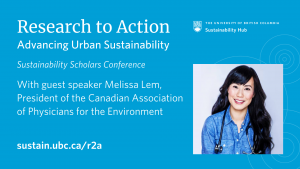Hello and Happy September!
The UBC Sustainability Hub is again offering UBC graduate students paid internships to do applied research on sustainability and climate change related topics. Projects begin October 16, 2023. Current UBC graduate students from all academic disciplines and all UBC campuses are encouraged to apply. I would greatly appreciate if you would please circulate this announcement (provided below) to grad students in your network.
Further information on the available internship projects can be found on the Sustainability Scholars Program web page. Applications close at midnight Sunday September 17, 2023.
We are also sharing the work of the summer 2023 Scholars cohort at the “Research To Action: Advancing Sustainability 2023”conference on September 25.
Details about the application deadline and the information sessions are below. Thank you for your help in notifying your graduate students about these opportunities! If you have any questions about the program or projects, please don’t hesitate to contact me.
Karen Taylor
**********
CALL FOR APPLICATIONS – UBC SUSTAINABILITY SCHOLARS (PAID INTERNSHIPS)
The UBC Sustainability Hub is pleased to offer UBC graduate students the opportunity to work on funded sustainability-themed applied research projects.
We are currently accepting applications for over several UBC Sustainability Scholars internships that will commence October 16, 2023. Current UBC graduate students from all academic disciplines are encouraged to confirm the eligibility requirements and apply.
Successful candidates will work under the guidance of a mentor at the partner organization, and are immersed in real world learning where they can apply their research skills and contribute to advancing organizational sustainability goals. Each Scholar receives $25 per hour to complete 250 hours of work.
For more information on the available projects and to apply, visit the Sustainability Scholars Program website. If, after reviewing the information on the website, you have further questions, feel free to reach out to sustainability.scholars@ubc.ca
Applications will be accepted until midnight Sunday September 17.
We also appreciate your help in circulating this notice to anyone in your grad student network that may be interested!
SAVE THE DATE!
CONFERENCE: RESEARCH TO ACTION: ADVANCING URBAN SUSTAINABILITY 2023
When: Monday, September 25, 1:00 PM – 5:00 PM
Where: Online via Zoom
Registration: Free to all. Registration closes September 24.
What happens when you give bright and engaged students real-world sustainability problems to solve?
UBC’s Sustainability Scholars are helping to make real change in the world! Join us on September 25 to learn more about what our local governments and institutions are doing to future-proof our people, our cities, our urban spaces, and the Fraser Estuary.
Be part of an afternoon of engaged discussion on a diverse range of applied sustainability projects produced by UBC graduate students in collaboration with our partner organizations, including the City of Vancouver, Metro Vancouver, Vancouver Coastal Health, Translink, many other local governments, local health authorities, and NGOs from across BC.
Scholars will present their projects in concurrent themed panel sessions throughout the afternoon. Panels will be moderated by experts from UBC and Sustainability Scholars Program partners.
Keynote Speaker: Melissa Lem, President: Canadian Association of Physicians for the Environment
Panel Themes: Biodiversity & Habitat | Adaptation & Resilience | Climate Action Engagement | Livable Cities | Planetary Health & Food Security | Capacity Building: Youth Engagement | Flood & Fire| Transportation
Conference Website:
https://sustain.ubc.ca/events/research-action-advancing-urban-sustainability-2023
Register here:
https://www.eventbrite.ca/e/research-to-action-advancing-urban-sustainability-2023-tickets-668932062807?aff=oddtdtcreator
About the Sustainability Scholars Program:
https://sustain.ubc.ca/teaching-applied-learning/ubc-sustainability-scholars-program
– – – – – – – – – –
Karen Taylor MA (she, her)
Senior Manager, Sustainability Scholars & Strategic Implementation | Sustainability Hub
The University of British Columbia | Vancouver Campus | Musqueam Traditional Territory
2343 – 2260 West Mall | Vancouver BC | V6T 1Z4 Canada
Phone 604 822 9362 | karen.taylor@ubc.ca | https://sustain.ubc.ca/scholars
